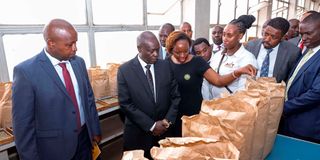Coffee auction volumes improve on deliveries by cooperative societies

Deputy President Rigathi Gachagua (second left) at the Nairobi Coffee Exchange, Wakulima House on August 15.
The volume of coffee delivered for sale on the Nairobi Coffee Exchange(NCE) has improved on bigger deliveries by cooperative societies.
Data from the NCE shows that during this week’s sale, some 11,339 bags of coffee worth $2.8million(Sh420.87million) were offered for trading—three times higher than the 3,930 bags worth $896,730.44 (Sh134.79 million) that were sold in the previous auction of September 26.
Traders linked the improvement to bigger deliveries by co-operative societies though still lower than the traditional minimum 15,000-20,000 bags delivered to the auction during the October-December main coffee crop season in Kenya.
“The improved deliveries are by the co-operative societies. The private firms still don’t have broker licences except for one known as Alliance Berries Limited which has already secured a permit hence cannot present crop to the auction” a trader told Business Daily.
“The export side of the market is okay and multinationals have remained active buying the available coffee brought to the auction” he added.
The average price per bag in Tuesday's auction improved from $192 (Sh28,865) to $208 (Sh31,270), lifting the spirits of farmers whose earnings have in recent times tumbled.
NCE chief executive officer, Lisper Ndung’ u said low-quality crop has affected participation at the auction in the past months.
“The main crop is coming. The quality, of course, will be so much better than the early crop. That would be one of the reasons,” said Ndung’u.
“The auction is becoming more rejuvenated, more active…like we are now slowly transitioning to the new regulatory framework. People are now getting to that stage of acceptance,” added Ndung’u.
The number of bags traded at NCE fell from a high of 22,853 on August 30 last year to below 4,000 in the period between July and September— leading to the suspension of trading for about four weeks. This was linked to the government’s decision to suspend coffee buyers and marketing licences pending reforms in coffee sales. Deputy President Rigathi Gachagua is spearheading the coffee reforms.
Agriculture and Livestock Development Cabinet Secretary Mithika Linturi claimed that his ministry had noted potential conflicts of interest by some players in the coffee trading chain which required to be addressed.
“The Ministry has taken note of many players participating in the coffee trade along the coffee value chain, the different roles that they play from farm to cup, and the challenges that coffee farmers face as a result of probable existing conflicts of interests amongst the various categories of value chain players,” he said in a notice through the Agriculture and Food Authority.
“While it is noted that millers are licensed by the county government, brokers by the Capital Markets Authority, and buyers by the Agriculture and Food Authority’s Coffee Directorate, it is regrettably noted that provisions of the Crops(Coffee)(General) Regulations,2019 have not been adhered to in some cases by licensing authorities” the notice further said.
The new rules, for example, do not allow a dealer to have multiple licences. For example, one is barred from being a broker and marketer at the same time.
Of the 121 licensed coffee buyers by the Agriculture and Food Authority for the 2023/24 season, only 58 had registered at the NCE to buy from the auction in August.
Most of the contracted millers had not been able to secure licences issued by county governments, affecting the flow of volumes to the exchange.
NCE chairman Peter Gikonyo, however, maintained that no licenses were suspended nor revoked.
Meanwhile, four newly-licensed farmer-owned coffee brokers participated in selling the beans at the auction this week.
The four brokers that have been cleared to start trading at the NCE include United Eastern, owned by Machakos Co-operative Union, and Meru Coffee Marketing which is owned by Meru Coffee Co-operative Union.
Others are Kipkellion which is owned by Kipkellion Co-operative Union and Kiambu Coffee Co-operative Union.
Kenya’s coffee is much sought after by roasters and blenders and the country sells its coffee to the world market. The international prices are used as a benchmark for the local price at the NCE.
The sector is however limping and requires a revamp as more farmers abandoned the crop for better rewarding ventures such as real estate and avocado farming. The State is currently battling to curb the slump amid concerns that the once thriving coffee sub-sector has lost its shine, with production declining from 130,000 tonnes to an average of 40,000.
Export earnings from coffee in the first half of the year dwindled with the country getting a total of Sh25.5 billion compared to Sh26.6 billion in the same period last year.





